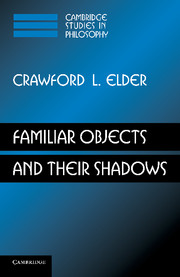Book contents
- Frontmatter
- Contents
- Acknowledgments
- Introduction
- 1 Two false friends of an ontology of familiar objects
- 2 Conventionalism as ontological relativism
- 3 Realism about material objects: persistence, persistence conditions, and natural kinds
- 4 Ontological preference for the temporally small
- 5 Ontological preference for microphysical causes
- 6 Ontological preference for the spatially small
- 7 A third false friend of familiar objects: universal mereological composition
- 8 Concluding Hegelian postscript
- Appendix: “Mutually interfering” dimensions of difference
- References
- Index
4 - Ontological preference for the temporally small
Published online by Cambridge University Press: 25 January 2011
- Frontmatter
- Contents
- Acknowledgments
- Introduction
- 1 Two false friends of an ontology of familiar objects
- 2 Conventionalism as ontological relativism
- 3 Realism about material objects: persistence, persistence conditions, and natural kinds
- 4 Ontological preference for the temporally small
- 5 Ontological preference for microphysical causes
- 6 Ontological preference for the spatially small
- 7 A third false friend of familiar objects: universal mereological composition
- 8 Concluding Hegelian postscript
- Appendix: “Mutually interfering” dimensions of difference
- References
- Index
Summary
Common sense and learned science alike suppose that the objects that they believe in – or the overwhelming majority of them, at least – persist across changes, exchanging one intrinsic property for another. A point familiar to those who have followed the recent literature on persistence, and amazing to those who have not, is that defending this commonplace supposition takes considerable philosophical effort. The first message of this chapter is that it takes even more effort than has yet been recognized – that a widely favored way of dealing with the philosophical problems that arise here, namely “stage theory” or “exdurantism,” as much betrays the convictions of common sense and learned science as it honors them. For exdurantism, unless supplemented, lands us in the “explosivism” scouted in chapter 1; and the only supplementations that will avert explosivism require that the temporal stages, in which exdurantism believes, be tied together in ways that exdurantism cannot explain – tied together by jointly occupying shadows cast by entities to which exdurantism cannot appeal.
The reason why exdurantism is widely favored is that it appears to combine two virtues, of which each rival view can claim only one. Perdurantism has the virtue of ruling, along with our commonplace supposition, that no contradiction is involved in one and the same object's possessing contrary properties – in the same poker's being now hot and later cold, or the same person's being now seated and later standing upright.
- Type
- Chapter
- Information
- Familiar Objects and their Shadows , pp. 70 - 87Publisher: Cambridge University PressPrint publication year: 2011



